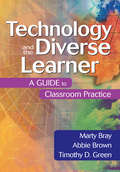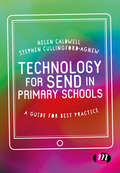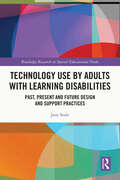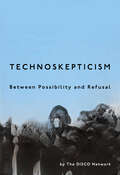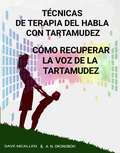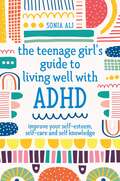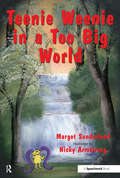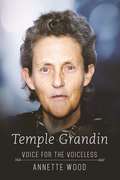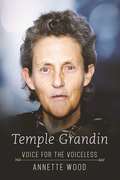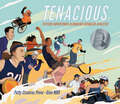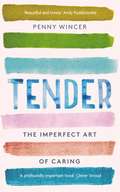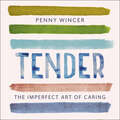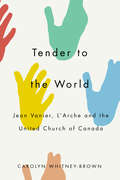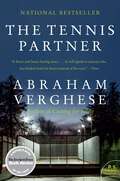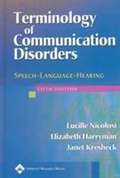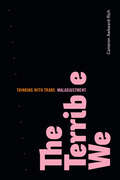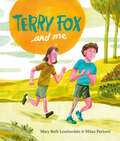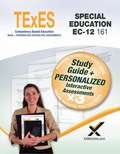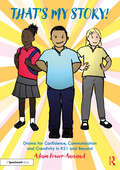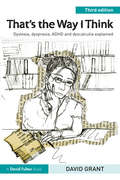- Table View
- List View
Technology and the Diverse Learner: A Guide to Classroom Practice
by Marty Bray Professor Abbie Brown Dr Timothy Tim GreenSpecifically designed for the K-12 inclusive classroom, this timely handbook demonstrates how to easily and effectively capitalize on available technology.
Technology for All Assistive Technology in the Classroom
by Overbrook School for the BlindAn easy-to-read, field tested resource for all schools and colleges that need assistive technology in the classroom.
Technology for SEND in Primary Schools: A guide for best practice
by Ms Helen Caldwell Steve Cullingford-AgnewWith so many new education technologies being developed and made available to schools, how do teachers ensure they select resources that enhance inclusive teaching in the classroom? How can you make sure new technologies are integrated into every day teaching? This new text supports trainee and beginning teachers to harness the power of technology to make their classrooms truly inclusive. It helps you make informed selections of new technology and resources and make them work for everyone in your classroom. Along with clear guidance on how to implement an inclusive approach to the use of technology across a broad range of needs and curriculum themes, linking practical examples with discussion of pedagogical considerations this practical book: focuses on cutting edge technologies supports teachers to develop the knowledge and skills they need offers advice on how to assess individual learning and communication needs develops an understanding of the pedagogy needed to embed inclusive technology within whole class teaching
Technology Use by Adults with Learning Disabilities: Past, Present and Future Design and Support Practices (Routledge Research in Special Educational Needs)
by Jane SealeThis book examines the role that technologies play in the lives of adults with learning disabilities. It analyses how design and support practices can be used to support access to technology in ways that can enhance opportunities and life experiences. Drawing on international literature and the author’s own research, the book considers what we know about past and present practices of supporting adults with learning disabilities to use technologies. It outlines how support practices can offer opportunities to overcome digital inequalities, offering a framework of core beliefs and knowledge that can inform future initiatives. The book has a particular focus on technologies, policies, practitioner communities and the characteristics of support practice. It also highlights the potential of people with learning disabilities, the potential of technology and the potential of the environment to support technology use. This important book will be highly relevant reading for academics, researchers and post-graduate students in the field of special educational needs and disabilities, digital education and learning technologies, inclusive education and social work.
Technoskepticism: Between Possibility and Refusal (Sensing Media: Aesthetics, Philosophy, and Cultures of Media)
by DISCO NetworkFrom Munchausen by Tiktok to wellness apps to online communities to AI, the DISCO Network explores the possibilities that technoskepticism can create. This is a book about possibility and refusal in relation to new technologies. Though refusal is an especially powerful mode—particularly for those who have historically not been given the option to say no—people of color and disabled people have long navigated the space between saying yes and saying no to the newest technologies. Technoskepticism relates some of these stories to reveal the possibilities skepticism can create. The case for technoskepticism unfolds across three sections: the first focused on disability, the creative use of wellness apps, and the desire for diagnosis; the second on digital nostalgia and home for Black and Asian users who produced communities online before home pages gave way to profiles; and the third focused on the violence inherent in A.I.-generated Black bodies and the possibilities for Black style in the age of A.I. Acknowledging how the urge to refuse new technologies emerges from specific racialized histories, the authors also emphasize how care can look like an exuberant embrace of the new.
Técnicas de terapia del habla con tartamudez: Cómo recuperar la voz de la tartamudez
by Dave McAllen A. N. Okonoboh.¿Es posible dejar de tartamudear en 10 días? ¿Cuál es el sueño más importante de tu vida? Como tartamudo, no quieres que yo ni nadie más simpaticemos cuando hablas. En nuestro libro TÉCNICAS DE TERAPIA DEL TRATAMIENTO DEL HABLA, lo tenemos en mente. Sabemos que cómo dejar de tartamudear es una cuestión que enfría a las comunidades tartamudeantes de todo el mundo. De hecho, nos damos cuenta de que en los grupos que tartamudean, a los enfermos se les dice que no se preocupen más por la recuperación, que tal esfuerzo es más devastador que el impedimento del habla en sí. Bueno, nuestra introducción a este libro de trabajo tiene historias muy inspiradoras para ayudar a disipar sus miedos. Ahora le daremos una idea general de las características de las TÉCNICAS DE TERAPIA DEL TRATAMIENTO DEL HABLA que hace que funcione tan rápido para la recuperación de la tartamudez. En primer lugar, este libro se basa en un estudio de años de verdaderos vencedores que tartamudean. Entonces, los contenidos no son teorías de laboratorio intelectual. Por eso funciona para personas reales. La clave central es la CONCIENCIA que corre como hilo conductor a través de los capítulos. En torno a esto, construimos otros elementos que son dignos de reconocimiento en sus roles positivos o negativos en nuestros discursos. Por ejemplo, el control de la respiración, la respiración desde el pecho o desde los pulmones, el arte de hablar, lidiar con obstáculos comunes, cómo usar sus esquemas de habla, etc. En la sección El arte de hablar, abordamos todos los problemas de patología del habla y el lenguaje, SLP, terapia cognitivo-conductual, alivio de la ansiedad, autocuración del tartamudeo, así como la pregunta de quién me ayudará a encontrar mi voz. La misma sección sigue replicando su efectividad en el desafío de la enseñanza del habla, terapia para niños, incluso para casos graves como aquellos que piensan que su situación está más allá d
The Teenage Girl's Guide to Living Well with ADHD: Improve your Self-Esteem, Self-Care and Self Knowledge
by Sonia AliHave you ever been told you are chatty or fidgety at school?Do you have a constantly whirring mind? Do you 'tune out' and daydream or find it hard to pay attention?ADHD can impact your life in many ways. This positive, self-affirming guide will increase your knowledge about ADHD and empower you in your daily life.The chapters are full of tips, tricks and life hacks so you can better manage your time, harness your creativity, energy and enthusiasm, and make more time for fun! Reflection activities and quizzes will help you better understand yourself and learn strategies on how to manage the intense emotions of rejection sensitivity. You'll learn the fundamentals of great self-care and how to look forward to life beyond school.Learn how ADHD brains work, and tricky concepts like executive functioning. Quick chapter summaries let you pick which sections are most relevant to you right now, and the strategies and visuals are designed for ADHD brains and can be used with support from parents, mentors or teachers.The Teenage Girl's Guide to Living Well with ADHD gives you all you need to build on your strengths and overcome challenges to fully embrace who you are and live your best life.
Teenie Weenie in a Too Big World: A Story for Fearful Children (Helping Children with Feelings)
by Margot Sunderland(A story for fearful children) One day Teenie Weenie finds himself in a scrumbly screechy place. It is full of noises and crashes and things that swoop and scratch. The worse it gets, the smaller Teenie Weenie feels. After a while, he feels so small that the tiniest insect tries to eat him up. Teenie Weenie feels terrified and desperately alone. But after a while along strolls a Wip-Wop bird who invites Teenie Weenie to come and have a chocolate muffin in his tree house. With the Wip Wop bird and his friend Hoggie, Teenie Weenie learns for the first time in his life all about the power of TOGETHER. He comes to know how very different things look when it's an US not just a ME. And so after that, whenever Teenie Weenie finds himself struggling alone with something too difficult or too frightening, he goes off and finds some TOGETHER.
Temple Grandin: Voice for the Voiceless
by Annette WoodSince Temple Grandin's life story was told in the 15 x Emmy-nominated film Temple Grandin, and since her heartwarming speech at the award ceremony, she has become one of the world's most well-known members of its community. In this fascinating biography, Annette Wood delves deep into Grandin's life from childhood to adulthood. Wood tells of the trials and tribulations of the icon: What difficulties Grandin struggled with and how she's become a hero for the autistic community. She also tells what Temple has done since the movie came out, where she is today, what kind of difference she's made, and what her future holds. For the 22 million people worldwide afflicted by autism and the countless friends and family members who support them, this brilliant portrait presents an up-close look at the disorder and renewed hope for what the future could bring for those on all levels of the spectrum.
Temple Grandin: Voice for the Voiceless
by Annette WoodSince Temple Grandin's life story was told in the 15 x Emmy-nominated film Temple Grandin, and since her heartwarming speech at the award ceremony, she has become one of the world's most well-known members of its community. In this fascinating biography, Annette Wood delves deep into Grandin's life from childhood to adulthood. Wood tells of the trials and tribulations of the icon: What difficulties Grandin struggled with and how she's become a hero for the autistic community. She also tells what Temple has done since the movie came out, where she is today, what kind of difference she's made, and what her future holds. For the 22 million people worldwide afflicted by autism and the countless friends and family members who support them, this brilliant portrait presents an up-close look at the disorder and renewed hope for what the future could bring for those on all levels of the spectrum.
Ten Fingers for God: The Complete Biography of Dr. Paul Brand
by Dorothy C. WilsonTen Fingers for God describes the extraordinary servanthood--the life of Dr. Paul Brand, a medical doctor, whose life and work have been a blessing to countless thousands of leprosy victims on five continents. Through surgeries (over 3,000 in India alone), the pioneering research he has conducted and inspired, and his empathy for the poor and forsaken. Dr. Brand has achieved fame in the medical world. Dr. Brand's professional life has centered on perhaps the most problematic aspect of creation, the existence of pain. His conviction that the function of pain in the human body is a disguised blessing to the human race. He felt that "God designed the human body so that it is able to survive because of pain. As a surgeon, teacher, and environmentalist. Dr. Brand 'has chosen the middle way of balancing the material and the mystical, the prophetic and the pragmatic. His spirit of self-sacrifice and humility can best be distilled by his sureness that "it is a pity that a man has only one life to spend, one pair of feet, two hands, ten fingers! Paul Brand is an adventure loving, highly spiritual surgeon who discovers his life's calling is to improve the hands and feet of people with leprosy worldwide. He developed techniques for returning functionality to disfigured, numb hands and feet and goes on to establish centers where patients receive protective shoes and learn skills to become employable. Paul both teaches others in many countries to help in his mission and learns from other doctors, scientists and rehabilitation specialists. In his travels and impassioned, informative speeches he raises awareness of this disease which is only contagious for a brief time and inspires people to pool their resources to improve care for a population ending their generations old fate of being shunned, ostracized and forced to beg for their survival.
Tenacious: Fifteen Adventures Alongside Disabled Athletes
by Patty Cisneros PrevoMeet fifteen remarkable athletes who use adaptive equipment in this beautiful and truth-telling picture book.A downhill skier whose blindness has sharpened her communication skills. An adaptive surfer who shreds waves while sitting down. A young man who excels at wheelchair motocross--but struggles with math. Tenacious tells their stories and more, revealing the daily joys and challenges of life as an athlete with disabilities. These competitors have won gold medals, set world records, climbed mountain peaks, claimed national championships, and many more extraordinary achievements. Get to know them in Tenacious!
Tender: The Imperfect Art of Caring - 'profoundly important' Clover Stroud
by Penny Wincer'A beautiful and important book that is both deeply engaging and usefully practical. I loved it.' CATHY RENTZENBRINK'An insightful and well-timed book ... forces us to confront the stereotypes - and prejudices - we hold.' SUNDAY TIMES'profoundly important...full of wisdom and bright insights on what it really means to love someone, by a fearless and generous writer. ' CLOVER STROUD'A beautiful and timely reminder that each and every one of us has the ability to care, the capacity for empathy, and the potential to grow.' ANDY PUDDICOMBE, FOUNDER OF HEADSPACE'A wonderful book: compassionate, honest, carefully-reasoned and genuinely helpful... This will benefit many people.' KATHERINE MAY, author of WINTERING 'An invaluable tool for any invisible carers or anyone who wants to learn how to better support their loved ones... we ALL have many, many things to learn from Penny's beautiful, wise, charming, thoughtful words' SCARLETT CURTIS, Sunday Times bestselling author'Moving and beautifully written, nuanced and wise, alert to every paradox at the heart of love. A hugely important book not only for current or future carers, but anyone learning to accept that life tends to resist our control.' OLIVIA SUDJIC, author of EXPOSURE'Tender captures the powerful capacity of people to care for others, and all the heartbreaking and heartwarming complexity that this involves. Penny brings the crucial, yet often overlooked, role of caring into our collective consciousness and, in doing so, demonstrates what it means to be human.' -DR EMMA HEPBURN, author of A TOOLKIT FOR MODERN LIFE'Penny Wincer's TENDER manages to combine both unromanticised honesty about the realities of care with a genuine uplifting hopefulness... is a must-read.' RUTH WHIPPMAN, author of THE PURSUIT OF HAPPINESSWe are all likely - at some point in our lives - to face the prospect of caring for another, whether it's a parent, child or partner. It is estimated that there are 7 million people in the UK caring for loved ones. And yet these are the unpaid, unsung people whose number is rising all the time. In Tender: the imperfect art of caring, Penny Wincer combines her own experiences as a carer with the experiences of others to offer real and transformative tools and insights for navigating a situation that many of us are either facing or will face at some time. Penny Wincer has twice been a carer: first to her mother, and now as a single parent to her autistic son. Tender shows how looking after oneself is a fundamental part of caring for another, and describes the qualities that we can look to cultivate in ourselves through what may otherwise feel to be an exhausting task. Weaving her lived experience with research into resilience, perfectionism and self-compassion, Penny combines the stories of other carers alongside those who receive support - offering an often surprising and hopeful perspective.Penny hosts a podcast Not Too Busy To Write.
Tender: The Imperfect Art of Caring - 'profoundly important' Clover Stroud
by Penny WincerA personal, positive and essential book for the many carers among us. 'A wonderful book: compassionate, honest, carefully-reasoned and genuinely helpful... This will benefit many people.' KATHERINE MAY, author of WINTERING 'An invaluable tool for any invisible carers or anyone who wants to learn how to better support their loved ones... we ALL have many, many things to learn from Penny's beautiful, wise, charming, thoughtful words' - SCARLETT CURTIS, Sunday Times bestselling author'An astonishing book about everyday experience. Moving and beautifully written, nuanced and wise, alert to every paradox at the heart of love. A hugely important book not only for current or future carers, but anyone learning to accept that life tends to resist our control.' - OLIVIA SUDJIC, author of EXPOSURE'Penny Wincer's TENDER manages to combine both unromanticised honesty about the realities of care with a genuine uplifting hopefulness... is a must-read.'- Ruth Whippman, author of THE PURSUIT OF HAPPINESS: WHY ARE WE DRIVING OURSELVES CRAZY AND HOW CAN WE STOP?We are all likely - at some point in our lives - to face the prospect of caring for another, whether it's a parent, child or partner. It is estimated that there are 7 million people in the UK caring for loved ones. And yet these are the unpaid, unsung people whose number is rising all the time. In Tender: the imperfect art of caring, Penny Wincer combines her own experiences as a carer with the experiences of others to offer real and transformative tools and insights for navigating a situation that many of us are either facing or will face at some time. Penny Wincer has twice been a carer: first to her mother, and now as a single parent to her autistic son. Tender shows how looking after oneself is a fundamental part of caring for another, and describes the qualities that we can look to cultivate in ourselves through what may otherwise feel to be an exhausting task. Weaving her lived experience with research into resilience, perfectionism and self-compassion, Penny combines the stories of other carers alongside those who receive support - offering an often surprising and hopeful perspective.
Tender Mercies
by Rosellen BrownLaura and Dan Courser are a less than perfect, but deeply passionate couple with two young children and lots of plans. Until Dan, displaying the boyish bravado that made Laura fall in love with him, takes the tiller of a boat he can't handle and causes the accident that changes their lives forever. Suddenly there are no more ordinary days or nights, as two people wrestle with a marriage in which all the rules are changed, confronting the guilt and anger, fear and desire that can tear apart families and lives. some profanity; description of a rape dream; sexual language; some intentional mis-spellings in the book indicate educational and social level TENDER MERCIES In Tender Mercies, the New York Times bestselling author of Before and After creates another heartbreaking portrait of a family in crisis-a haunting, unforgettable novel of love, loss, and healing.
Tender to the World: Jean Vanier, L'Arche, and the United Church of Canada
by Carolyn Whitney-Brown"What is the secret that allows L'Arche to exist? I'll tell you: pleasure!" explains Jean Vanier, founder of the international federation of L'Arche communities where people with and without intellectual disabilities share their lives. Vanier's spiritual vision and playful sense of humour shaped L'Arche, but the organization was also informed by its surprising history with the United Church of Canada. In Tender to the World Carolyn Whitney-Brown explores the connections between the two organizations through diverse critical insights from Julia Kristeva, Doreen Massey, and Mikhail Bakhtin, as well as Vanier's controversial articulation of the gift of weakness. Tracing the five-decade relationship between L'Arche and the United Church alongside evolving disability theories, Whitney-Brown examines both the fundamental importance of stories and the agency of people with intellectual disabilities. Inversion - a transformative overturning of expectations in social interactions - can be upsetting or exciting, challenging or inspiring, she argues. This book offers a fresh look at how L'Arche and the United Church have worked to break down walls of difference, illuminating how each tenders something unexpected to the other and to the world. At a time when many are seeking new visions for society, the long and complex relationship between Canada's largest Protestant denomination and L'Arche offers both encouragement and a deeper way to approach questions of living in diverse communities.
The Tennis Partner: A Doctor's Story of Friendship and Loss
by Abraham VergheseAn unforgettable, illuminating story of how men live and how they survive, from Abraham Verghese, the acclaimed New York Times bestselling author of Cutting for Stone and The Covenant of Water, an Oprah's Book Club Pick.“Heartbreaking. . . . Indelible and haunting, [The Tennis Partner] is an elegy to friendship found, and an ode to a good friend lost.”—The Boston GlobeWhen Abraham Verghese, a physician whose marriage is unraveling, relocates to El Paso, Texas, he hopes to make a fresh start as a staff member at the county hospital. There he meets David Smith, a medical student recovering from drug addiction, and the two men begin a tennis ritual that allows them to shed their inhibitions and find security in the sport they love and with each other. This friendship between doctor and intern grows increasingly rich and complex, more intimate than two men usually allow. Just when it seems nothing can go wrong, the dark beast from David’s past emerges once again—and almost everything Verghese has come to trust and believe in is threatened as David spirals out of control.
Terminology Of Communication Disorders: Speech-Language-Hearing
by Lucille Nicolosi Elizabeth Harryman Janet KresheckThe leading dictionary/sourcebook of terms for speech, language, and hearing pathology, Terminology of Communication Disorders is intended for students in speech, language, and hearing disorders programs, faculty, and practitioners. Terms are listed alphabetically and cross-referenced for synonyms and related terms, accommodating the sometimes complex classifications of Speech, Language, and Hearing disorders.
The Terrible We: Thinking with Trans Maladjustment (ASTERISK)
by Cameron Awkward-RichIn The Terrible We Cameron Awkward-Rich thinks with the bad feelings and mad habits of thought that persist in both transphobic discourse and trans cultural production. Observing that trans studies was founded on a split from and disavowal of madness, illness, and disability, Awkward-Rich argues for and models a trans criticism that works against this disavowal. By tracing the coproduction of the categories of disabled and transgender in the United States at the turn of the twentieth century and analyzing transmasculine literature and theory by Eli Clare, Elliott DeLine, Dylan Scholinski, and others, Awkward-Rich suggests that thinking with maladjustment might provide new perspectives on the impasses arising from the conflicted relationships among trans, feminist, and queer. In so doing, he demonstrates that rather than only impeding or confining trans life, thought, and creativity, forms of maladjustment have also been and will continue to be central to their development.Duke University Press Scholars of Color First Book Award recipient
Terry Fox and Me
by Mary Beth LeatherdaleCelebrating the 40th anniversary of the Terry Fox Marathon of Hope, this picture book biography tells the story of a friendship defined by strength and love.Before Terry Fox become a national hero and icon, he was just a regular kid. But even then, his characteristic strength, determination and loyalty were apparent and were the foundation for his friendship with Doug. The two first met at basketball tryouts in grammar school. Terry was the smallest - and worst - basketball player on the court. But that didn't stop him. With Doug's help, Terry practiced and practiced until he earned a spot on the team. As they grew up, the best friends supported each other, challenged each other, helped each other become better athletes and better people. Doug was by Terry's side every step of the way: when Terry received a diagnosis of cancer in his leg, when he was learning to walk - then run - with a prosthetic leg and while he was training for the race of his life, his Marathon of Hope. Written from Doug's perspective, this story shows that Terry Fox's legacy goes beyond the physical and individual accomplishments of a disabled athlete and honors the true value of friendship.
Tess: The Story of a Guide Dog
by Peter PurvesThe raising of a guide dog in the United Kingdom. Readers will enjoy the adventures that Tess has, from running away, to eating all sorts of things, and digging up all the flowers. A delightful book for all ages.
TExES Special Education EC-12 161: Teacher Certification
by Sharon A. WynneAre you ready to become a special education teacher in Texas? Use XAMonline’s TExES Special Education EC-12 study guide to help you pass your teacher certification exam and advance your career. <p><p> Aligned with current TExES standards, our study guide provides a comprehensive review of all nine domains, including:<p> Legal Mandates and Historical Aspects<br> Identification Characteristics<br> Processing Skills<br> Assessment Methods, Use, and interpretation<br> Classroom Management<br> Teaching Strategies<br> Curriculum and Instructional Content<br> Instructional Materials and Technology, and<br> Support and Professionals<br> <p> We give you a thorough review of all domains, competencies, skills, and focus statements tested on the TExES Special Education EC-12 (161) exam. Unlike other teacher certification test preparation material, our TExES Special Education EC-12 study guide drills all the way down to the focus statement level, providing detailed examples of the range, type, and level of content that appear on the test. <p> The book includes three full-length multiple-choice practice tests to help you test your knowledge, understand how the exam is weighted, and identify skills and competencies you need to focus on. Our detailed answer explanations reference related skills in the book, allowing you to identify your strengths and weaknesses and interact with the content effectively. Maximize your study by prioritizing domains and skills you need to focus on the most to pass the exam. <p> This study guide is perfect for college students, teachers, and career-changing professionals who want to become a special education teacher in Texas.
That's My Story!: Drama for Confidence, Communication and Creativity in KS1 and Beyond
by Adam Power-AnnandThe ability to communicate is an essential life skill for all children and young people and it underpins their social, emotional and educational development. If a child experiences a positive relationship with an adult listening carefully, they are more likely to constructively share their thoughts, feelings and their imaginative ideas.That’s My Story! places children’s imagined stories at the heart of their own development and provides a joyful, creative approach to support young children’s personal and social development and to encourage their communication. In this book you will find: Tried-and-tested drama games and activities that support communication and well-being, all adaptable to complement your current practice Guidance and advice on how to promote positive adult-child interactions Examples of creative interventions that support children’s communication development A celebration of the joy that comes with carefully listening to children’s own imagined stories Those of us who work with children can sense a tangible connection between how young children feel and how they communicate. This essential and practical resource will be valuable reading for primary teachers, teaching assistants, speech and language therapists, and drama practitioners, as well as outreach and education departments of theatre companies and other arts organisations.
That's the Way I Think: Dyslexia, dyspraxia, ADHD and dyscalculia explained
by David GrantAbout 1 in 20 individuals are dyslexic. This figure also applies for dyspraxia and ADHD. This fully revised edition of David Grant’s thought-provoking, insightful book develops our understanding of these specific learning differences and considers the further challenges presented by these overlapping conditions. This new edition includes a brand-new chapter on dyscalculia. New sections also explore updates in the study of dyslexia, dyspraxia and ADHD as well as visualisation and synaesthesia, in the light of new data and research. These updates enable the reader to gain a fuller understanding of the sensory experiences and thoughts of individuals with specific learning differences. The author takes a life-style approach to explain many of the everyday experiences and choices of individuals with specific learning differences, including sleep, sports, visualisation and creativity, and uses real life examples explained in the words of those with specific learning differences. The accessible style of this book will immediately strike a chord with anyone with first or second-hand experience of specific learning differences. It is invaluable and insightful reading for those with specific learning differences as well as their parents and/or partner, teachers, teaching assistants and SENCos.
THE MOST ABSURD MYTHS ABOUT DEAFNESS IN WORLD HISTORY
by Regina Alonso Karla M. V.The present study gathered mentions and historical data on the vision of society about deaf people dating back the first mankind reports on the topic. The analysis of the facts accessed several sources, comprising a broad variety of texts, from books and scientific websites to entertainment brochures. The study had as objective and goal the compilation of a material with examples of some of the most absurd myths and mentions ever documented about human deafness, showing the power of creative ignorance and how this can hinder even more the life of people inflicted by hearing impairment. The findings pointed out to some considerations; the most obvious is the power of religious ignorance and ill-conceived interpretations and translations, as well as the people's fear when coming across something they do not understand and, for this reason, they end up not knowing how to react. However, it is necessary to make clear that the authors never had the intention of disrespecting, offending or humiliating the authors of the examples used and their religious beliefs. Ultimately, the present study has the purpose of introducing myths and considerations about deaf people and trying to unveil these myths to elucidate and provide explanations for their correction. It also aims at divulging obtained and analyzed technical data to record them permanently, providing a study and data source to encourage other researchers in the area to develop further studies.
